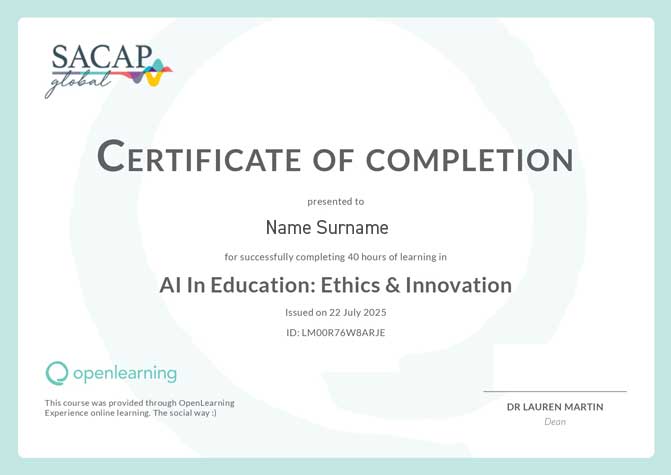AI in Education: Ethics & Innovation
R3,500.00

Course Overview
Are you ready to shape the future of education? Dive into AI fundamentals and learn how to responsibly incorporate AI into lesson plans, content and educational settings.
The AI in Education: Ethics & Innovation short course provides educators with the essential knowledge and skills to effectively integrate AI into the classroom while maintaining ethical standards.
This 40-hour short course blends theory and hands-on experience while exploring foundational concepts of AI and AI applications in education. Learners will build practical skills for prompt engineering and AI-powered lesson design so they can create personalised and adaptive learning experiences.
The course dives into strategies for evaluating AI-generated content, from chatbot responses to tailored learning pathways, ensuring quality and relevance in student interactions.
A key focus is on the ethical integration of AI technologies. Learn how to use AI responsibly in the teaching environment, balancing innovation with fairness, transparency and equity.
By the end of this course, educators will have the confidence to seamlessly incorporate AI into teaching practices, enhancing student engagement and learning outcomes.
FAQs
What are the entry requirements?
Anyone 18 years of age or older can sign up for this short course. There are no academic entry requirements or conditions.
Who is this short course for?
This short course is for anyone working within education wanting to understand how to use Artificial Intelligence (AI) in teaching and learning.
What is the time commitment?
A total of 40 hours is required to complete the short course.
What do you need to do the short course?
- Access to Microsoft Word
- Google Chrome (recommended)
- Stable internet connection
- AI Chatbots & Assistants (e.g., ChatGPT, Google Gemini, or Claude)
- Canva account (free version)
- Miro account (free version)
Is the short course accredited?
The short course is not accredited and non-credit bearing.
What is artificial intelligence (AI)?
Artificial intelligence (AI) is technology that enables computers to perform tasks that typically need human thinking. This includes understanding and translating language, recognising images or speech, analysing information, providing advice, and more.
What is artificial intelligence (AI) integration?
Artificial Intelligence (AI) integration in education explores AI-driven strategies that enhance student engagement, personalize learning, and streamline tasks. Read more here.
Course highlights

-
Gain a solid foundation in AI and its educational applications.
-
Get hands-on experience with prompt engineering and AI-powered lesson design.
-
Build confidence to incorporate AI effectively into your teaching while upholding ethical standards.
Dates and Registration
Class of 2025 Aug-Dec: 18 August – 31 December
Short course classes are on demand allowing you to register at any time and move through course content at a time that suits you. Learners will have access to the course for the class period they choose when registering.
Certification
Upon completion, you will receive a digital certificate of completion. This certificate verifies your newfound knowledge and skills.

The AI in Education: Ethics & Innovation short course has been designed and developed by experts in the field of education, artificial intelligence, and instructional design. The course is for educators, who want to learn about tools and practices for the responsible use of AI across diverse educational settings.
What You’ll Learn
Through course videos, readings and discussions, you will explore the following topics:
AI Fundamentals and Ethical Foundations
Explore core AI concepts and their role in education, from personalizing learning experiences to automating administrative tasks and leveraging data-driven insights for improved teaching. Delve into key ethical principles, including fairness, accountability, and privacy, ensuring a thoughtful and responsible approach to AI integration.
Practical AI Skills and Applications
AI’s capabilities and limitations explored through real-world case studies. Develop practical AI skills, including prompt engineering, enabling them to refine AI-generated responses and tailor AI applications to meet their specific teaching objectives.
Critical and Philosophical Perspectives
Engage with philosophical frameworks such as Post-humanism and Futurism, critically examining AI’s long-term impact on education and society. Reflect on the evolving role of educators in an AI-driven world and explore how AI can shape future learning paradigms.
AI Integration in Practice
Design and implement AI-enhanced lesson plans and integrate ethical, practical, and pedagogical considerations, ensuring responsible AI use.
Course Outcomes
By the end of this short course you will be able to:
Understand AI Fundamentals
Grasp key AI concepts and their impact on education.
Evaluate AI Applications
Assess the benefits, feasibility, and ethical considerations of AI in the classroom.
Develop Effective Prompts
Learn to craft AI prompts that optimize learning outcomes and improve AI-generated content.
Apply Ethical AI Practices
Implement strategies to ensure fairness, and accountability, and mitigate bias in AI-driven education.
Critically Analyze AI Outputs
Use structured assessment tools, such as the ROBOT test, to evaluate AI-generated responses for accuracy, objectivity, and reliability.
Integrate AI into Lesson Plans
Design and implement AI-enhanced lesson plans that are effective, ethical, and student-centred.
Embrace AI with Confidence
Enhance teaching strategies and shape the future of education responsibly.
The Team
The SACAP Global team brings a wealth of knowledge and practical experience across various disciplines. Our expert short course developers and dedicated support team are passionate about sharing their insights to help you get the most out of your online learning journey.




















